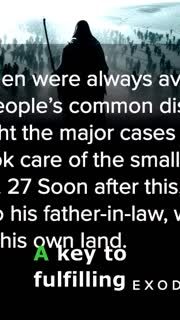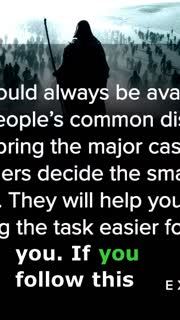Empowering Growth Through Mentorship and Father Figures
Devotional
Sermon Summary
Bible Study Guide
Sermon Clips
### Quotes for Outreach
1. "When we have father figures in our lives, it produces greater stability. It produces greater guidance. It opens up the door for more opportunities. Also, when a young person lives in a fatherless home, here's what happens. 25 million children in the U.S. live without their biological fathers. 85% of the folks, of the kids in prison, are from fatherless homes. 71% of high school dropouts are from fatherless homes. 90% of all homeless children or runaways are from fatherless homes. Even so, when there is a father figure, some kind of an adult, pouring in to those children, 55% are more likely to go to college, 78% are more likely to volunteer regularly, and 130% are more likely to hold leadership positions." (46 seconds)
2. "There's something in each of us, isn't there? There's an ache to be encouraged, to be challenged, to be said, hey man, I see you. I affirm what's good in you. I challenge what's bad in you. And I believe in you. I know you can do this. I know you can slay that dragon. I'm betting most of you felt something like that ache before. Even if you had an awesome dad. I had an awesome dad. He didn't fail in any of those respects. And yet, I still wanted, as I became a young man, I wanted the affirmation of other men who could kind of evaluate and say, is this guy a man or isn't he?" (31 seconds)
3. "A key to fulfilling our purpose involves succeeding with the help of others. Succeeding with the help of others and helping others succeed. That's what Jethro did for Moses. He helped him succeed and Moses succeeded because he had help. It's trying to be clarified for us here in the book of Exodus that even if you're Moses, and really guys, I mean, think this through. Moses is writing this. He's saying, hey, people in the future who are going to read this, just so you know, even I need counsel from a mentor." (34 seconds)
4. "True affirmation requires men to humbly listen to counsel. What happened? Moses listened to his father's advice and followed his suggestions and he chose those leaders. He listened and he chose. He didn't just listen. He listened and then he chose. Moses knew what every wise person knows. It's only wisdom if you do it. If he would have just listened to the wisdom of Jethro, it wouldn't have made Moses wise. He's not wise until he does the wisdom." (26 seconds)
5. "True affirmation requires men to humbly listen to counsel. And here's number two, to affectionately offer counsel, to affectionately offer counsel. Think about how Jethro gives counsel here. He waits until the day is over. He waits until Moses is kind of worn out. He waits until Moses, Moses is like, oh man, that was hard. But he also does it in a way that makes Moses feel important. He's got the timing, right? My friends, if you're going to share feedback with folks, we want to get the timing right." (32 seconds)
### Quotes for Members
1. "Sometimes, maybe for you, you have mishandled the mentoring thing. As I have on different occasions. There was a time, there's probably multiple times when I was wanting a certain person to be a mentor to me. But honestly, there were times I was so arrogant around them that they learned quickly, I don't know, this one's too difficult. This isn't going to be so easy. I'm going to move on to an easier guy. Maybe you've been like me also who, when God did entrust you with someone else to encourage them, maybe you messed it up a little bit. Maybe you didn't do the right thing and you didn't end up helping him in the way that you'd hoped you could." (31 seconds)
2. "Moses, so he asked him, Moses' father-in-law saw that Moses was doing for all the people. He asked, what are you really accomplishing here? Why are you trying to do all this alone while everyone stands around you? From morning till evening. Okay. So this is the end of the day. Jethro has just watched Moses, big lines of people coming to Moses, sitting down in this little booth. And they're saying, well, here's the story. Here's what we did. Moses weighs in. Well, here's what God thinks. Here's what you should do. Jethro's watched him all day. Moses gets home. It's probably, you know, time to eat, eat dinner. Let's all sit down. And Jethro says, by the way, Moses, I've been watching this and I just want to know, what are you doing? What do you think you're like, what are you accomplishing here? Why are you doing this? Why are you doing this? Why are you doing this alone?" (44 seconds)
3. "Moses wisely was open to that. He was open to Jethro. Jethro, I mean, he's like, Moses, this thing is good that you're doing. Like, it's a good heart that you're doing it. I hear why it's you. It makes sense that it's you. It's just that the way you're doing it, bro, you're not going to last like this. How are you ever going to lead these people if you got to meet with every single one of them? Moses was blessed to have Jethro." (26 seconds)
4. "If you follow this advice and if God commands you to do so, then you will be able to endure the pressures and all these people will go home in peace. Moses listened to his father-in-law's advice and followed his suggestions. He chose capable men from all over Israel and appointed them as leaders over the people, put them in charge of groups of 1,000, 100, 50, and 10. These men were available to solve the people's common disputes. They brought the major cases to Moses, but they took care of the smaller matters themselves. Soon after this, Moses said goodbye to his father-in-law who returned to his own land." (31 seconds)
5. "What's God doing here? What's God doing with Moses? And he's really doing it with Jethro too. He's coming as wisdom to them. He's coming as the sage Jesus. Jesus is wisdom from God for us. Is it possible? Jesus' wisdom has been coming to you and sometimes you like me have rejected it. You're like, I can't hear this. We're really being unteachable. And we say, wisdom from God, go away. Go Because this looks like wisdom to me over here. If that's true, I want to tell you, welcome to the club. I've done that a lot. He comes again to get us. Here's something Jesus said, all that my father gives me will come to me. And the one who comes to me, I will certainly not cast out. See, even though we resist wisdom, wisdom keeps coming. It says, well, let's try again. Well, let's try again. Why? Because Jesus doesn't give up ever. Love never gives up. He'll just keep chasing you. He'll just keep coming. He'll be like, oh, you didn't do that. Let's try it this way. Let me tell you through somebody else. Let me tell you through somebody else. Let me tell you through a wipeout. Boom. Let me tell you through somebody else. Your God loves you so much. He will come chasing you with wisdom." (81 seconds)
Ask a question about this sermon
1. "When we have father figures in our lives, it produces greater stability. It produces greater guidance. It opens up the door for more opportunities. Also, when a young person lives in a fatherless home, here's what happens. 25 million children in the U.S. live without their biological fathers. 85% of the folks, of the kids in prison, are from fatherless homes. 71% of high school dropouts are from fatherless homes. 90% of all homeless children or runaways are from fatherless homes. Even so, when there is a father figure, some kind of an adult, pouring in to those children, 55% are more likely to go to college, 78% are more likely to volunteer regularly, and 130% are more likely to hold leadership positions." (46 seconds)
2. "There's something in each of us, isn't there? There's an ache to be encouraged, to be challenged, to be said, hey man, I see you. I affirm what's good in you. I challenge what's bad in you. And I believe in you. I know you can do this. I know you can slay that dragon. I'm betting most of you felt something like that ache before. Even if you had an awesome dad. I had an awesome dad. He didn't fail in any of those respects. And yet, I still wanted, as I became a young man, I wanted the affirmation of other men who could kind of evaluate and say, is this guy a man or isn't he?" (31 seconds)
3. "A key to fulfilling our purpose involves succeeding with the help of others. Succeeding with the help of others and helping others succeed. That's what Jethro did for Moses. He helped him succeed and Moses succeeded because he had help. It's trying to be clarified for us here in the book of Exodus that even if you're Moses, and really guys, I mean, think this through. Moses is writing this. He's saying, hey, people in the future who are going to read this, just so you know, even I need counsel from a mentor." (34 seconds)
4. "True affirmation requires men to humbly listen to counsel. What happened? Moses listened to his father's advice and followed his suggestions and he chose those leaders. He listened and he chose. He didn't just listen. He listened and then he chose. Moses knew what every wise person knows. It's only wisdom if you do it. If he would have just listened to the wisdom of Jethro, it wouldn't have made Moses wise. He's not wise until he does the wisdom." (26 seconds)
5. "True affirmation requires men to humbly listen to counsel. And here's number two, to affectionately offer counsel, to affectionately offer counsel. Think about how Jethro gives counsel here. He waits until the day is over. He waits until Moses is kind of worn out. He waits until Moses, Moses is like, oh man, that was hard. But he also does it in a way that makes Moses feel important. He's got the timing, right? My friends, if you're going to share feedback with folks, we want to get the timing right." (32 seconds)
### Quotes for Members
1. "Sometimes, maybe for you, you have mishandled the mentoring thing. As I have on different occasions. There was a time, there's probably multiple times when I was wanting a certain person to be a mentor to me. But honestly, there were times I was so arrogant around them that they learned quickly, I don't know, this one's too difficult. This isn't going to be so easy. I'm going to move on to an easier guy. Maybe you've been like me also who, when God did entrust you with someone else to encourage them, maybe you messed it up a little bit. Maybe you didn't do the right thing and you didn't end up helping him in the way that you'd hoped you could." (31 seconds)
2. "Moses, so he asked him, Moses' father-in-law saw that Moses was doing for all the people. He asked, what are you really accomplishing here? Why are you trying to do all this alone while everyone stands around you? From morning till evening. Okay. So this is the end of the day. Jethro has just watched Moses, big lines of people coming to Moses, sitting down in this little booth. And they're saying, well, here's the story. Here's what we did. Moses weighs in. Well, here's what God thinks. Here's what you should do. Jethro's watched him all day. Moses gets home. It's probably, you know, time to eat, eat dinner. Let's all sit down. And Jethro says, by the way, Moses, I've been watching this and I just want to know, what are you doing? What do you think you're like, what are you accomplishing here? Why are you doing this? Why are you doing this? Why are you doing this alone?" (44 seconds)
3. "Moses wisely was open to that. He was open to Jethro. Jethro, I mean, he's like, Moses, this thing is good that you're doing. Like, it's a good heart that you're doing it. I hear why it's you. It makes sense that it's you. It's just that the way you're doing it, bro, you're not going to last like this. How are you ever going to lead these people if you got to meet with every single one of them? Moses was blessed to have Jethro." (26 seconds)
4. "If you follow this advice and if God commands you to do so, then you will be able to endure the pressures and all these people will go home in peace. Moses listened to his father-in-law's advice and followed his suggestions. He chose capable men from all over Israel and appointed them as leaders over the people, put them in charge of groups of 1,000, 100, 50, and 10. These men were available to solve the people's common disputes. They brought the major cases to Moses, but they took care of the smaller matters themselves. Soon after this, Moses said goodbye to his father-in-law who returned to his own land." (31 seconds)
5. "What's God doing here? What's God doing with Moses? And he's really doing it with Jethro too. He's coming as wisdom to them. He's coming as the sage Jesus. Jesus is wisdom from God for us. Is it possible? Jesus' wisdom has been coming to you and sometimes you like me have rejected it. You're like, I can't hear this. We're really being unteachable. And we say, wisdom from God, go away. Go Because this looks like wisdom to me over here. If that's true, I want to tell you, welcome to the club. I've done that a lot. He comes again to get us. Here's something Jesus said, all that my father gives me will come to me. And the one who comes to me, I will certainly not cast out. See, even though we resist wisdom, wisdom keeps coming. It says, well, let's try again. Well, let's try again. Why? Because Jesus doesn't give up ever. Love never gives up. He'll just keep chasing you. He'll just keep coming. He'll be like, oh, you didn't do that. Let's try it this way. Let me tell you through somebody else. Let me tell you through somebody else. Let me tell you through a wipeout. Boom. Let me tell you through somebody else. Your God loves you so much. He will come chasing you with wisdom." (81 seconds)









